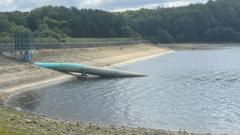Is Yorkshire Facing Its First Hosepipe Ban of 2025?

Understanding the Hosepipe Ban in Yorkshire: Causes, Implications, and Future Outlook
In a significant move that affects over five million residents in Yorkshire, a hosepipe ban has been implemented, making it the first region in the UK to introduce such restrictions this year. This article delves into the reasons behind the ban, its implications for local residents, and the broader context of water supply challenges faced by the region. With climate change and population growth creating additional pressure on water resources, understanding the situation is crucial for all Yorkshire residents.
The Context Behind the Ban
The hosepipe ban, set to take effect from Friday, has been prompted by an unprecedented dry spell in the region. Yorkshire Water reported that the spring months from February to June were the driest and warmest on record, with rainfall measuring only 15 centimeters—less than half of what is typically expected during this period. This alarming trend has led the Environment Agency to declare a drought in Yorkshire, prompting urgent action to conserve water.
Dave Kaye, the director of water at Yorkshire Water, emphasized that the restrictions aim to ensure adequate supply for essential needs while protecting the local environment. The hosepipe ban prohibits a range of activities, including:
- Watering gardens
- Washing cars
- Filling paddling pools
Anyone found violating the ban could face fines of up to £1,000, highlighting the seriousness of the situation. The ban affects a wide area, including much of Yorkshire, parts of North Lincolnshire, and Derbyshire.
The Current State of Water Supplies
As of early July, reservoir levels in Yorkshire stand at just over 50%, which is notably below the average level of approximately 80% for this time of year. Kaye noted that water supplies are usually replenished by spring rainfall; however, reservoir stocks have been declining since January. Although recent rain has provided some relief, it has not been sufficient to counter the adverse effects of prolonged dry weather and high temperatures.
Yorkshire Water has supplied an additional 4.3 billion liters of water between April and June compared to a typical year, enough to supply Leeds for five weeks. This increased demand for water, coupled with the low reservoir levels, underscores the urgency of the hosepipe ban.
Factors Contributing to Water Supply Challenges
The hosepipe ban is not an isolated event. Various factors contribute to the water supply challenges faced by Yorkshire:
- Climate Change: The changing climate has resulted in increasingly erratic weather patterns, with three exceptionally dry springs recorded in the last 14 years. This trend affects the natural replenishment of water supplies.
- Population Growth: Since 2000, Yorkshire's population has increased by approximately 500,000, leading to higher water demand without corresponding infrastructure development to support it.
- Aging Infrastructure: The existing water supply system has not seen the construction of new reservoirs since 1966. This lack of infrastructure development exacerbates the challenges posed by increased demand and lower rainfall.
- Water Leakage: Yorkshire Water has reported that 21% of its supplies are lost due to leaks, which is higher than the national average of 19%. Although the company has implemented measures to fix leaks, this issue remains a significant concern.
Historical Context of Hosepipe Bans in Yorkshire
Hosepipe bans in Yorkshire are relatively rare, with this being only the third ban in the last 30 years. However, the frequency of such restrictions has been increasing, as seen in 2022 when water usage was also curtailed. This raises questions about the long-term viability of the region's water supply and the necessity for ongoing water management strategies.
As the situation evolves, it is crucial to consider how Yorkshire can adapt to the changing climate and growing population. The significant drop in reservoir capacity—from full levels at the beginning of the year to just over half by mid-summer—indicates a need for serious contemplation about water management practices moving forward.
Immediate and Long-Term Solutions
In response to the current crisis, Yorkshire Water has implemented the hosepipe ban as an immediate measure to conserve water. However, addressing the long-term challenges will require a multifaceted approach that includes:
1. Infrastructure Investment
Investing in new water infrastructure, including reservoirs and treatment facilities, is essential for meeting the future demands of a growing population. Without such investment, Yorkshire will continue to face water shortages during dry spells.
2. Leak Management
Improving leak detection and repair processes can significantly reduce the amount of water lost in the supply system. Yorkshire Water has been proactive in addressing leaks, but continued efforts are necessary to reach optimal levels.
3. Public Awareness Campaigns
Raising awareness about water conservation among residents can lead to more responsible water usage. Educational campaigns can encourage individuals to adopt habits that minimize water waste.
4. Sustainable Water Practices
Encouraging the use of sustainable practices in agriculture, landscaping, and other water-intensive activities can help to reduce overall demand. This includes promoting drought-resistant plants, efficient irrigation systems, and rainwater harvesting.
Conclusion: Preparing for Future Water Challenges
The hosepipe ban in Yorkshire serves as a stark reminder of the growing pressures on water resources due to climate change and population growth. While the immediate effects of the ban may be inconvenient for residents, it is a necessary step to ensure sustainable water supplies for the future. As we navigate these challenges, it is crucial for both individuals and policymakers to engage in proactive water management strategies.
As we look toward the future, the question remains: How can we collectively work towards a more sustainable approach to water usage in Yorkshire and beyond? This ongoing dialogue is critical in safeguarding our most precious resource.
Frequently Asked Questions
Why is there a hosepipe ban in Yorkshire?
The hosepipe ban is due to exceptionally low rainfall during the spring months, resulting in critically low reservoir levels and increased demand for water.
What activities are restricted under the hosepipe ban?
The ban prohibits the use of hosepipes for activities such as watering gardens, washing cars, and filling paddling pools.
What are the consequences of violating the hosepipe ban?
Individuals who violate the hosepipe ban could face fines of up to £1,000, emphasizing the seriousness of the restrictions.
How can residents conserve water during the ban?
Residents can conserve water by adopting practices such as using watering cans instead of hosepipes, fixing leaks in their homes, and utilizing drought-resistant plants in their gardens.
As Yorkshire navigates through this challenging time, the importance of collective action and sustainable water management practices cannot be overstated. How can you contribute to water conservation efforts in your community? #WaterConservation #HosepipeBan #YorkshireWater
Published: 2025-07-08 07:28:08 | Category: technology



